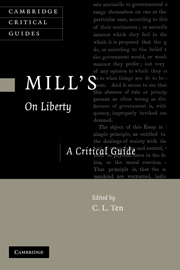Book contents
- Frontmatter
- Contents
- List of contributors
- Mill's On Liberty: Introduction
- 1 Mill's case for liberty
- 2 Mill's liberal principles and freedom of expression
- 3 Racism, blasphemy, and free speech
- 4 State neutrality and controversial values in On Liberty
- 5 Rawls's critique of On Liberty
- 6 Mill on consensual domination
- 7 Autonomy, tradition, and the enforcement of morality
- 8 Mill and multiculturalism
- 9 Mill, liberty, and (genetic) “experiments in living”
- 10 John Stuart Mill, Ronald Dworkin, and paternalism
- Bibliography
- Index
9 - Mill, liberty, and (genetic) “experiments in living”
Published online by Cambridge University Press: 01 July 2009
- Frontmatter
- Contents
- List of contributors
- Mill's On Liberty: Introduction
- 1 Mill's case for liberty
- 2 Mill's liberal principles and freedom of expression
- 3 Racism, blasphemy, and free speech
- 4 State neutrality and controversial values in On Liberty
- 5 Rawls's critique of On Liberty
- 6 Mill on consensual domination
- 7 Autonomy, tradition, and the enforcement of morality
- 8 Mill and multiculturalism
- 9 Mill, liberty, and (genetic) “experiments in living”
- 10 John Stuart Mill, Ronald Dworkin, and paternalism
- Bibliography
- Index
Summary
INTRODUCTION
Few cases have arisen in the contemporary policy domain that John Stuart Mill, were he alive today, would likely deem “harder” than the case of human reproductive cloning. In this chapter, I explore the question of whether Mill's views on liberty – its justifications and limits – would support or condemn recourse by private individuals to reproductive cloning technology. Should people be left free to conduct this kind of (genetic) “experiment in living”? As we shall see, even though cloning was not a known theoretical possibility in Mill's time, his writings have plenty that is instructive to offer on the topic.
Mill's curiosity about the moral and legal debate over cloning would have been piqued, or so one imagines, by the fact that almost everyone – scientists, citizens, and governments – has come down against it. Putting aside speculations about Mill's own attitude to the cloning debate, it merits emphasis that virtually all contributors to it, if they trouble with theory at all, have variously referenced notions of liberty or utility. Yet most of those who claim that their positions are backed either by liberalism or by utilitarianism, and, on occasion, by both at once, have not troubled much to spell out the theoretical basis of their arguments. Others still have proceeded as if they are wholly ignorant of rather glaring inconsistencies in their reasoning.
Mill furnishes a coherent, theoretically rich context in which to explore the moral permissibility of reproductive cloning.
- Type
- Chapter
- Information
- Mill's On LibertyA Critical Guide, pp. 185 - 208Publisher: Cambridge University PressPrint publication year: 2009
- 1
- Cited by



